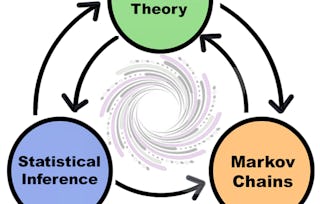The course "Foundations of Probability and Random Variables" introduces fundamental concepts in probability and random variables, essential for understanding computational methods in computer science and data science. Through five comprehensive modules, learners will explore combinatorial analysis, probability, conditional probability, and both discrete and continuous random variables. By mastering these topics, students will gain the ability to solve complex problems involving uncertainty, design probabilistic models, and apply these concepts in fields like machine learning, AI, and algorithm design.

Foundations of Probability and Random Variables

Foundations of Probability and Random Variables
This course is part of Statistical Methods for Computer Science Specialization


Instructors: Ian McCulloh
1,630 already enrolled
Included with
Recommended experience
What you'll learn
Master combinatorial techniques, including permutations, combinations, and multinomial coefficients, to solve counting and probability problems.
Apply probability axioms, construct Venn diagrams, and calculate sample space sizes to evaluate probabilities in various scenarios.
Utilize Bayes' formula, the multiplication rule, and conditional probability to assess event relationships and solve real-world problems.
Analyze discrete and continuous random variables using probability density functions, cumulative distribution functions, and expected values.
Skills you'll gain
Details to know

Add to your LinkedIn profile
21 assignments
See how employees at top companies are mastering in-demand skills

Build your subject-matter expertise
- Learn new concepts from industry experts
- Gain a foundational understanding of a subject or tool
- Develop job-relevant skills with hands-on projects
- Earn a shareable career certificate

There are 6 modules in this course
This course provides a comprehensive introduction to fundamental concepts in probability and statistics, focusing on counting principles, permutations, combinations, and multinomial coefficients. You will explore probability axioms, conditional probabilities, and Bayes’s Formula while using Venn diagrams to visualize events. The course covers random variables, including discrete and continuous types, expected values, and various probability distributions. Practical applications in R programming and data analysis tools will enhance understanding through simulations and real-world problem-solving. By the end, you will be equipped to analyze and interpret statistical data effectively.
What's included
2 readings1 plugin
This module covers the usefulness of an effective method for counting the number of ways that things can occur. Many problems in probability theory can be solved simply by counting the number of different ways that a certain event can occur.
What's included
9 videos2 readings3 assignments1 ungraded lab
This module introduces the concept of the probability of an event and then shows how probabilities can be computed in certain situations.
What's included
9 videos3 readings4 assignments1 ungraded lab
This module explores one of the most important concepts in probability theory, that of conditional probability. The importance of this concept is twofold. First, you will be interested in calculating probabilities when some partial information concerning the result of an experiment is available; in such a situation, the desired probabilities are conditional. Second, even when no partial information is available, conditional probabilities can often be used to compute the desired probabilities more easily.
What's included
8 videos3 readings4 assignments1 ungraded lab
This module discusses the function of outcomes rather than the actual outcomes themselves. In particular, you will examine random variables that can take on at most a countable number of possible values. You can call these types of variables, discrete random variables.
What's included
9 videos4 readings5 assignments1 ungraded lab
This module extends the concept of random variables where the outcomes cannot be counted. You will explore probability density functions, cumulative distribution functions, the normal distribution and other common distributions.
What's included
10 videos4 readings5 assignments1 ungraded lab
Earn a career certificate
Add this credential to your LinkedIn profile, resume, or CV. Share it on social media and in your performance review.
Instructors


Offered by
Explore more from Probability and Statistics
 Status: Free Trial
Status: Free TrialUniversity of Colorado Boulder
 Status: Free Trial
Status: Free TrialDartmouth College
 Status: Preview
Status: PreviewNortheastern University
 Status: Free Trial
Status: Free TrialUniversity of Pittsburgh
Why people choose Coursera for their career

Felipe M.

Jennifer J.

Larry W.

Chaitanya A.

Open new doors with Coursera Plus
Unlimited access to 10,000+ world-class courses, hands-on projects, and job-ready certificate programs - all included in your subscription
Advance your career with an online degree
Earn a degree from world-class universities - 100% online
Join over 3,400 global companies that choose Coursera for Business
Upskill your employees to excel in the digital economy
Frequently asked questions
To access the course materials, assignments and to earn a Certificate, you will need to purchase the Certificate experience when you enroll in a course. You can try a Free Trial instead, or apply for Financial Aid. The course may offer 'Full Course, No Certificate' instead. This option lets you see all course materials, submit required assessments, and get a final grade. This also means that you will not be able to purchase a Certificate experience.
When you enroll in the course, you get access to all of the courses in the Specialization, and you earn a certificate when you complete the work. Your electronic Certificate will be added to your Accomplishments page - from there, you can print your Certificate or add it to your LinkedIn profile.
Yes. In select learning programs, you can apply for financial aid or a scholarship if you can’t afford the enrollment fee. If fin aid or scholarship is available for your learning program selection, you’ll find a link to apply on the description page.
More questions
Financial aid available,

